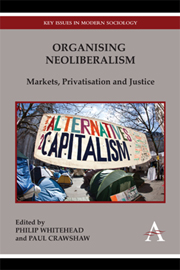Book contents
- Frontmatter
- Contents
- Chapter 1 Introduction: A Preliminary Mapping of the Terrain
- Chapter 2 Neoliberalism and Crime in the United States and the United Kingdom
- Chapter 3 Neoliberalism, Prisons and Probation in the United States and England and Wales
- Chapter 4 The Neoliberal Wings of the ‘Smoke-Breathing Dragon’: The Cigarette Counterfeiting Business and Economic Development in the People's Republic of China
- Chapter 5 A Neoliberal Security Complex?
- Chapter 6 The Influence of Neoliberalism on the Development of the English Youth Justice System under New Labour
- Chapter 7 Institutionalising Commercialism? The Case of Social Marketing for Health in the United Kingdom
- Chapter 8 Neoliberal Policy, Quality and Inequality in Undergraduate Degrees
- Chapter 9 Religion and Criminal Justice in Canada, England and Wales: Community Chaplaincy and Resistance to the Surging Tide of Neoliberal Orthodoxy
- Chapter 10 Markets, Privatisation and Justice: Some Critical Reflections
- Notes on Contributors
- Index
Chapter 5 - A Neoliberal Security Complex?
Published online by Cambridge University Press: 05 February 2013
- Frontmatter
- Contents
- Chapter 1 Introduction: A Preliminary Mapping of the Terrain
- Chapter 2 Neoliberalism and Crime in the United States and the United Kingdom
- Chapter 3 Neoliberalism, Prisons and Probation in the United States and England and Wales
- Chapter 4 The Neoliberal Wings of the ‘Smoke-Breathing Dragon’: The Cigarette Counterfeiting Business and Economic Development in the People's Republic of China
- Chapter 5 A Neoliberal Security Complex?
- Chapter 6 The Influence of Neoliberalism on the Development of the English Youth Justice System under New Labour
- Chapter 7 Institutionalising Commercialism? The Case of Social Marketing for Health in the United Kingdom
- Chapter 8 Neoliberal Policy, Quality and Inequality in Undergraduate Degrees
- Chapter 9 Religion and Criminal Justice in Canada, England and Wales: Community Chaplaincy and Resistance to the Surging Tide of Neoliberal Orthodoxy
- Chapter 10 Markets, Privatisation and Justice: Some Critical Reflections
- Notes on Contributors
- Index
Summary
Introduction
The global onslaught since the late 1970s of policies obsessed with levelling obstacles to free markets, the privatisation of public services and entire sectors of the economy, the marketisation of public goods and the deregulation particularly of the labour market, in short, neoliberalism as economic dogma and policy recipe is today regularly associated with developments in criminal justice, particularly with what many critical scholars today identify as a decisive punitive turn in penal policy (e.g. Garland 2001; Simon 2007; Wacquant 2001, 2009b; Young 1999). It is less certain whether the study of policing makes this association with the same intensity. It is true that the dominance of neoliberalism and the social and political restructuring it brings about is present in considerations of changes in the role, organisation and operations of the police. However, the particular paths that the sociology of the police has taken seem to be preventing a systematic unravelling of the relation between neoliberalism and change in policing. On one hand, there is a clear trend to take a wider approach to the questions of policing and security (Johnston and Shearing 2003; Loader and Walker 2007), one that draws its ancestry from an earlier bold change of focus away from the workings of the public police to a wider institutional assemblage of public and private actors involved in the provision of security (Shearing and Stenning 1981, 1983).
- Type
- Chapter
- Information
- Organising NeoliberalismMarkets, Privatisation and Justice, pp. 105 - 134Publisher: Anthem PressPrint publication year: 2012

